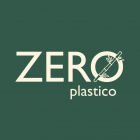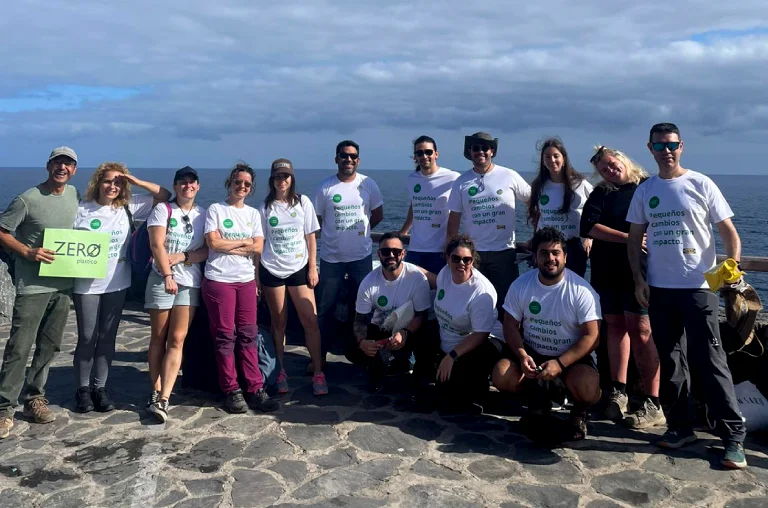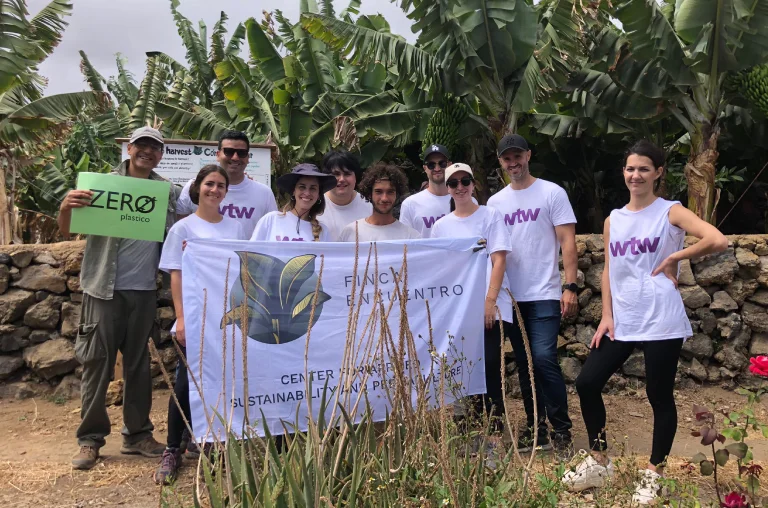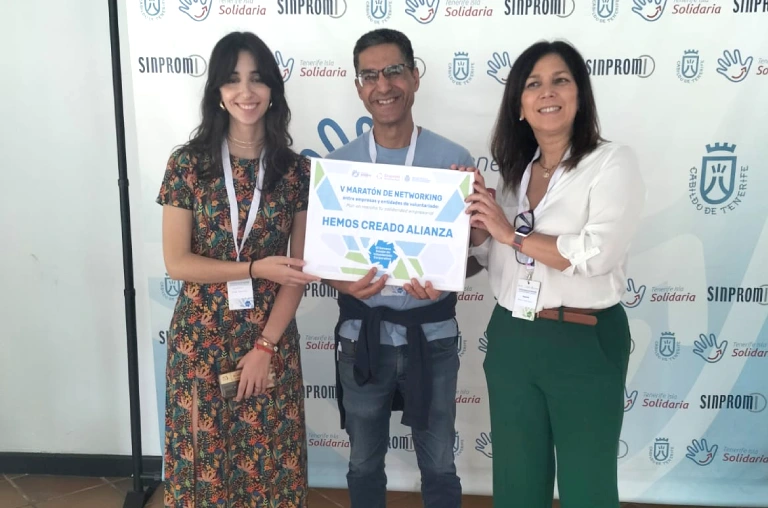Perhaps you have heard the term sustainable development. You probably think of it as a concept related to pollution, consumption and environmental protection. If so, you’re not so lost! In reality, sustainable development also includes population growth and the use of natural resources to produce all the goods we need and those we do not need. At Greenpeace we want to focus on the sustainability of life. Thus, the concept of sustainable development appeared for the first time in the Brundtland Report of 1987. The report warned of the negative impact of economic activity on the environment and the threat posed by future population growth.
By 2040, there will be approximately 3 billion middle-class consumers, increasing demand for natural resources.
Here we briefly explain what sustainable development is and how it is related to the economic transformation that changes the logic of consumption. By improving our practices and reducing consumption, we can contribute to a promising future of well-being for all.
At Greenpeace Mexico we want a sustainable future like you.
That is why we created the Responsible Consumption Platform. This includes asking local governments for input and agreeing to make it happen.
What is sustainable development?
Simply put, according to the Brundtland Report, sustainability means development that meets the needs of the present in a way that balances economic growth, environmental protection and well-being without compromising the opportunities of future generations. of the society.
Global action is needed to address the biggest challenges facing humanity: hunger, inequality leading to poverty, the destruction of the planet and climate change.
For this reason, sustainable development has become an essential part of the 2030 Agenda adopted by the United Nations (UN) in 2015, and many countries are working to improve the lives of everyone on the planet. Responsible consumption is one of the decisions we can make on a personal level to move towards a more sustainable social life.
To achieve sustainable development and general well-being, it is important to consider not only economic issues, but also social cohesion and environmental protection. One of the most important aspects of achieving sustainability is, of course, eliminating the excessive use of natural resources used to produce the products and goods we consume.
It is important to note that although “sustainable development” and “sustainable development” have been used synonymously for some time, the former term is preferred for reasons of accuracy.
Other activities that Greenpeace Mexico believes contribute to the achievement of development goals include economic transformation, that is, a focus on the sustainability of life in all its aspects (natural, political, social and cultural).
We can change the paradigm by moving the economy. A collaborative economy with social and environmental impact helps reorient our role as consumers.
Sustainable development goals
According to the 2030 Agenda, the United Nations Action Plan to achieve sustainable development includes a total of 17 goals, of which 169 are commitments signed by more than 190 countries.
Of the 17 tasks, six are directly related to environmental issues, but all aim to increase the level of protection of nature and resources.
Responsible consumption is included in Goal #12 because its impact on the environment and vice versa, consumerism threatens the safe future of life on Earth. Achieving responsible consumption means reducing, reusing and recycling food waste and waste per capita. According to the United Nations, when the world’s population reaches 9.6 billion in 2050, as predicted, the equivalent of three planets, including Earth, will be needed to meet resource demand.
As individuals, we have an obligation to do our part. The collaborative economy encourages us to question our roles and think about what we consume and how we do it. At Greenpeace Mexico we are interested in involving more people in better consumption and reducing practices that pollute the environment and waste natural resources. Learn how to consume better and ask your local government to take appropriate responsible consumption measures.
Sustainable development in Mexico
In Mexico, according to the government’s own assessment, there are four problem areas where improving consumption would have a positive impact on the country. That is, the relationship between economic growth and environmental degradation, recent shortages, cities and food waste.
As Mexico’s gross domestic product (GDP) grew between 1990 and 2010, its population grew.
io, as well as carbon dioxide (CO2) emissions, the generation of solid waste and the generation of industrial waste. During this period, approximately 6 million hectares of forests and jungles were destroyed throughout the country.
Therefore, responsible production and consumption are a central issue in Mexico. Based on international commitments and national legal frameworks, countries must ensure compliance with the goals of Goal 12.
By 2018, three years after the launch of the 2030 Agenda, Mexico had managed to reduce the economic costs of natural resource depletion and environmental degradation by 9% (2). However, there is still much to be done, especially in terms of preserving and protecting biodiversity, biocultural heritage and revitalizing local economies. Fortunately, as a society we can and must act. Greenpeace offers a variety of options and consumer guides that you can follow to live a more balanced life while caring for the planet. Responsible consumption is one of the individual measures that has an important positive impact the more people participate. Please join us in signing this petition to help governments implement guidelines and do your part to ensure better consumption.
Let’s improve consumption with peas!
At Greenpeace México we are committed to helping you become a responsible consumer. Therefore, on our platform you will find information, advice and recommendations to achieve this goal. To consume better, we must act responsibly and review our consumer habits and habits, including eliminating unnecessary products, purchasing less essential goods, and aligning consumption with the local economy. Our responsible consumption website is designed so that you can easily access and discover the topics that interest you most. What connects all the dots is an interest in reducing the negative impact on the planet through green measures and lifestyles.
The “Responsible Consumption” platform is divided into four axes of action: mobility, nutrition, green economy and energy. The green tips are divided into four different areas to help you put them into practice in your daily life. The first is mobility, and we are committed to models that do not focus on the car. To achieve this goal, we must encourage the use of public transport, bicycles and other forms of transport wherever possible. This contributes to reducing greenhouse gas emissions.
In the field of food, we are also committed to sustainable and environmentally friendly production and consumption models, without neglecting the nutritional value of foods that allow a healthy life. To be truly sustainable, we also need justice for local producers. Its objective is to counteract industrial agriculture and livestock farming, which in Mexico (and the world) are having a huge negative impact on the planet.
The third dimension, Green Economy, includes tips and recommendations to move towards a more conscious purchase. Conscious consumption means consuming less, consuming without buying (through alternative means such as bartering, borrowing and reusing), and buying wisely. In addition to protecting your finances (for example, by avoiding unnecessary expenses), it also helps producers and retailers to invest more in environmentally friendly products. Consume better and help the planet! Finally, it is important to trust renewable energy. This means prioritizing products that are derived from renewable natural resources, such as solar or wind energy, and that do not produce greenhouse gas emissions when used.
Furthermore, this promotes community participation and local use, and investment in this regard is considered a better option compared to private renewable energy megaprojects that use everything. It all adds up! With these four axes I am sure you will be able to reduce your consumption and find a better way. In addition to protecting nature, you also have the opportunity to live a healthier life. On our platform you can also find articles such as those recommended in this publication, as well as documented information processed by research. For example: Do you know which websites are the least popular ecologically? To help you practice responsible spending habits, we’ve created a series of downloadable guides to help you live a lifestyle that’s not only healthy but also environmentally friendly.
Downloadable guides include a meat-free cookbook, a sustainable business directory, and a bike travel guide. Lots of tips to change your habits and take care of the earth! Finally, if you want to know your contribution to emissions of greenhouse gases, use our handy carbon footprint calculator to calculate your personal total and make a diagnosis that will help you develop the right habits in your life and start putting them into practice. At Greenpeace we recognize that change is not just personal. That is why we encourage you to tune into our platform, share our content with your support network and sign our petition encouraging governments to invest in policies aimed at responsible consumption and environmental protection.







